Reflective Learning: Improving Summative Work in Higher Ed
VerifiedAdded on 2023/06/16
|8
|2241
|280
Essay
AI Summary
This essay reflects on the importance of reflective learning in higher education, emphasizing the value of formative feedback in improving summative assessments. The essay utilizes Gibbs' Reflective Cycle to analyze the author's learning experiences, focusing on both positive experiences and challenges encountered. It highlights the significance of feedback and feed-forward mechanisms in enhancing performance and promoting self-awareness. The author discusses how feedback from seniors and superiors helped identify areas for improvement and build confidence. The essay concludes that reflective learning, combined with effective feedback strategies, is crucial for student success and prepares them for future academic and professional endeavors. Desklib provides students access to similar essays and study tools.
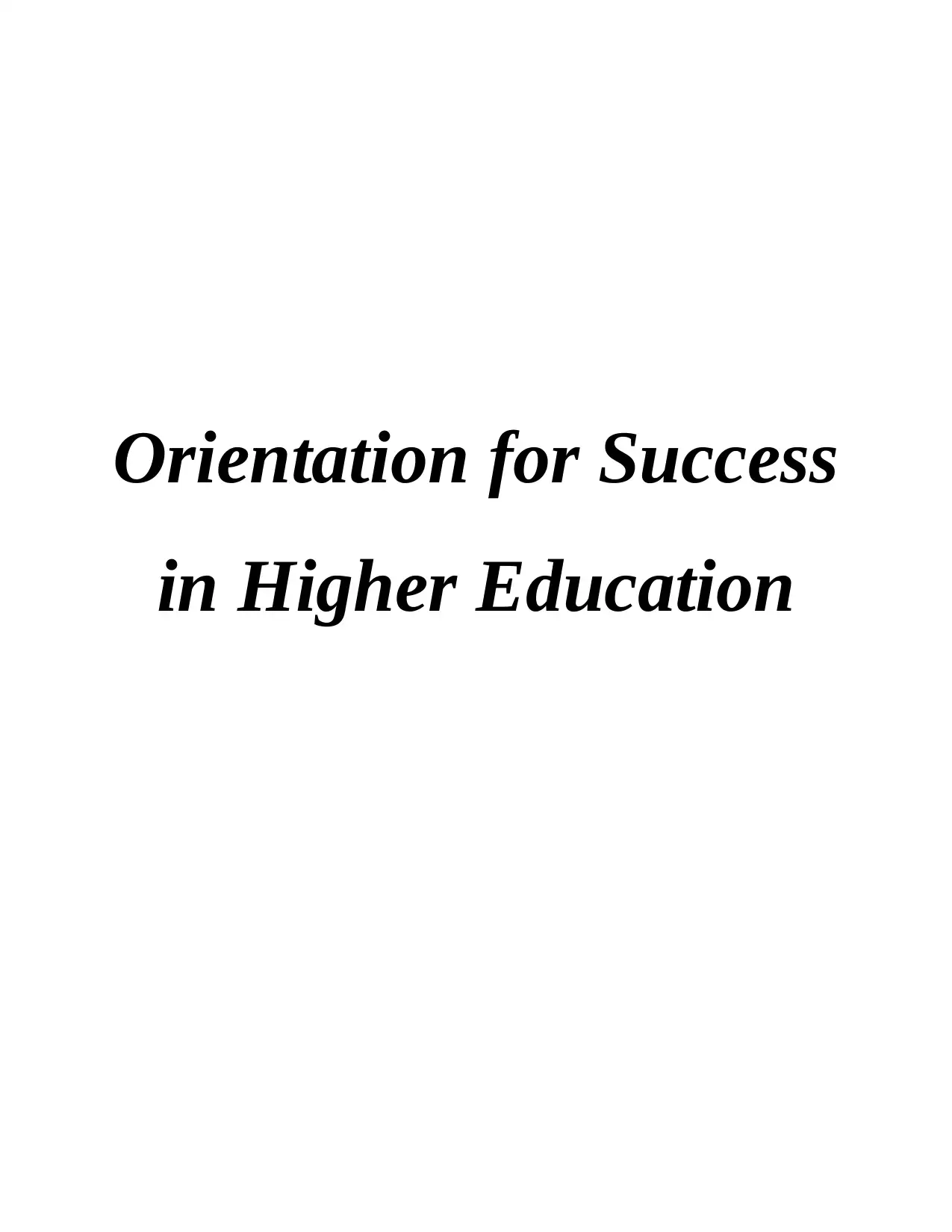
Orientation for Success
in Higher Education
in Higher Education
Paraphrase This Document
Need a fresh take? Get an instant paraphrase of this document with our AI Paraphraser
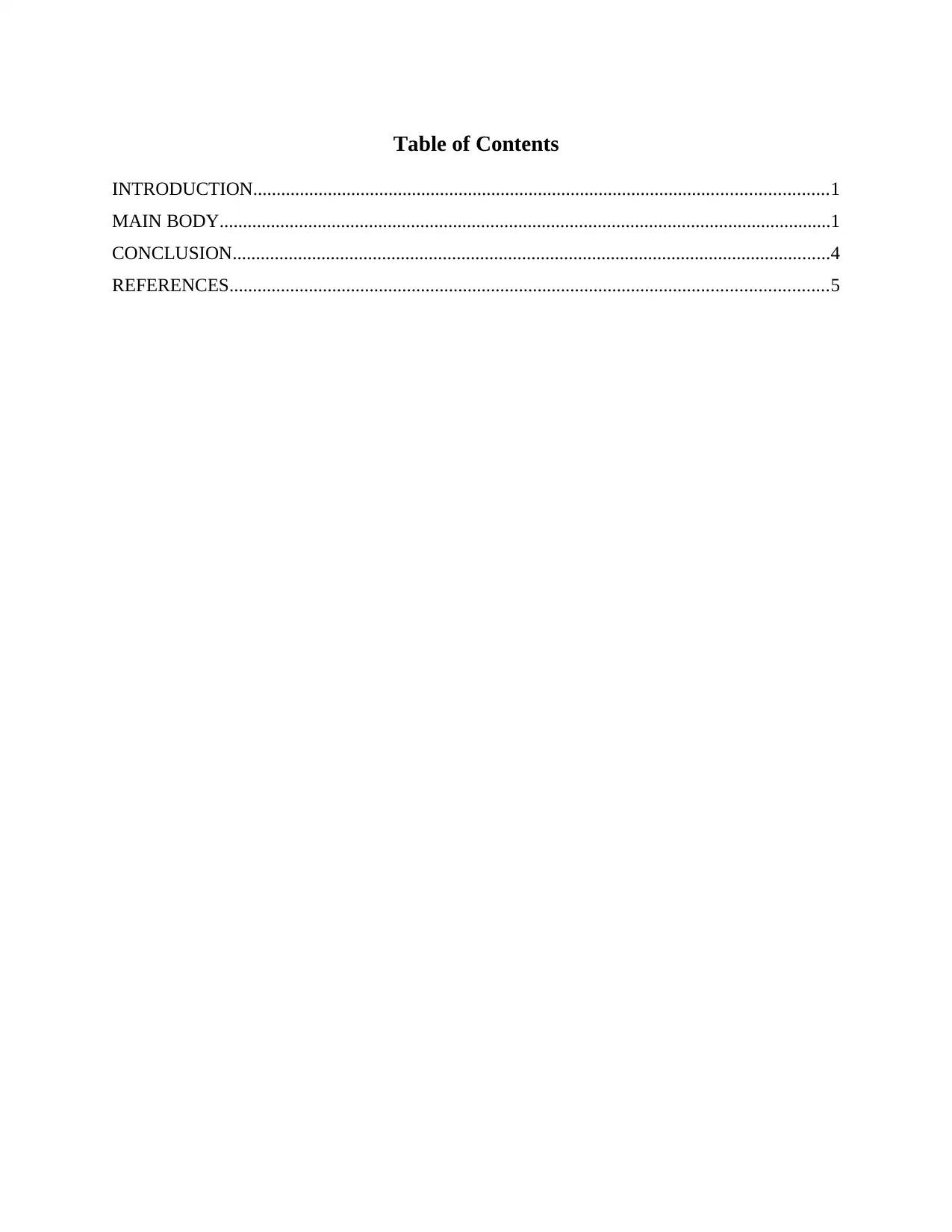
Table of Contents
INTRODUCTION...........................................................................................................................1
MAIN BODY...................................................................................................................................1
CONCLUSION................................................................................................................................4
REFERENCES................................................................................................................................5
INTRODUCTION...........................................................................................................................1
MAIN BODY...................................................................................................................................1
CONCLUSION................................................................................................................................4
REFERENCES................................................................................................................................5
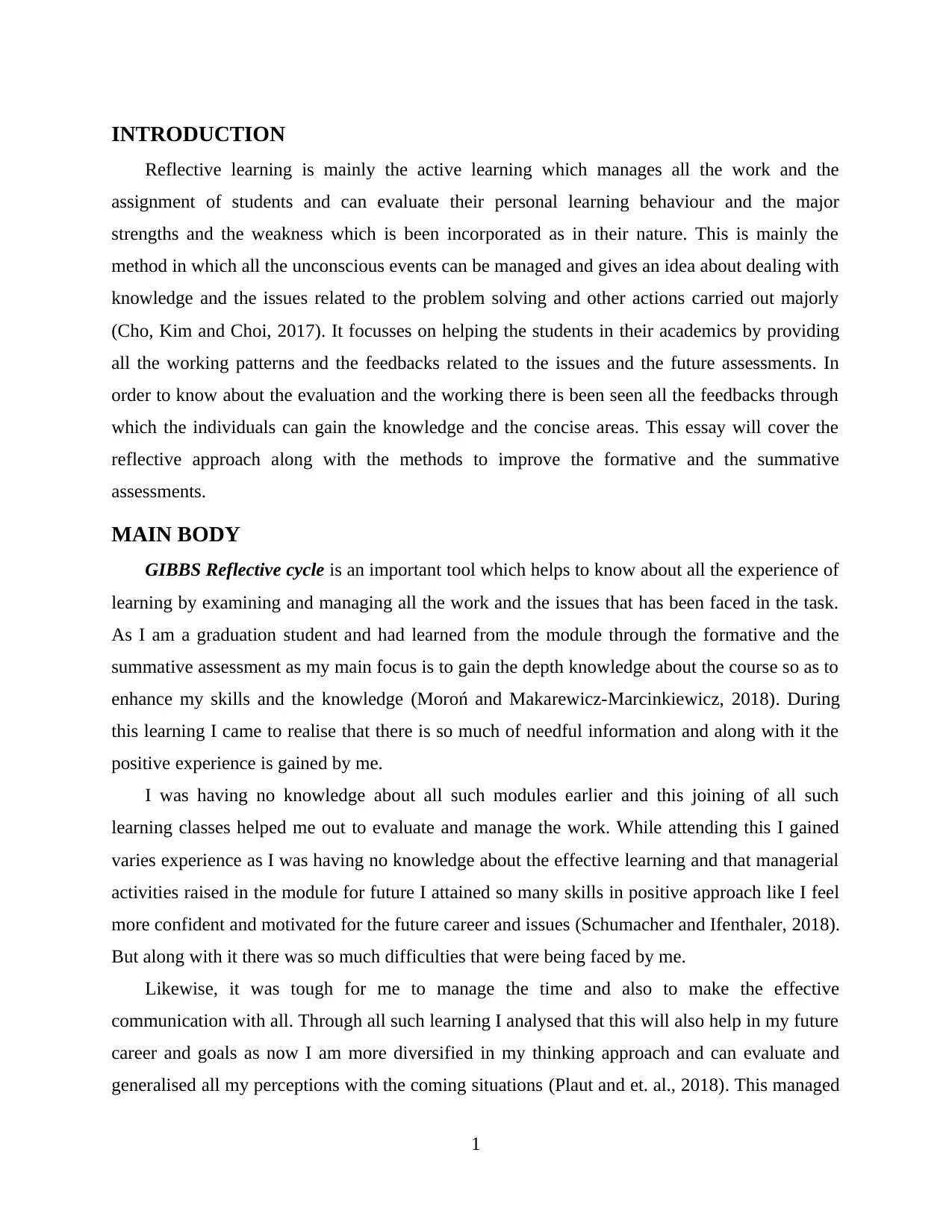
INTRODUCTION
Reflective learning is mainly the active learning which manages all the work and the
assignment of students and can evaluate their personal learning behaviour and the major
strengths and the weakness which is been incorporated as in their nature. This is mainly the
method in which all the unconscious events can be managed and gives an idea about dealing with
knowledge and the issues related to the problem solving and other actions carried out majorly
(Cho, Kim and Choi, 2017). It focusses on helping the students in their academics by providing
all the working patterns and the feedbacks related to the issues and the future assessments. In
order to know about the evaluation and the working there is been seen all the feedbacks through
which the individuals can gain the knowledge and the concise areas. This essay will cover the
reflective approach along with the methods to improve the formative and the summative
assessments.
MAIN BODY
GIBBS Reflective cycle is an important tool which helps to know about all the experience of
learning by examining and managing all the work and the issues that has been faced in the task.
As I am a graduation student and had learned from the module through the formative and the
summative assessment as my main focus is to gain the depth knowledge about the course so as to
enhance my skills and the knowledge (Moroń and Makarewicz-Marcinkiewicz, 2018). During
this learning I came to realise that there is so much of needful information and along with it the
positive experience is gained by me.
I was having no knowledge about all such modules earlier and this joining of all such
learning classes helped me out to evaluate and manage the work. While attending this I gained
varies experience as I was having no knowledge about the effective learning and that managerial
activities raised in the module for future I attained so many skills in positive approach like I feel
more confident and motivated for the future career and issues (Schumacher and Ifenthaler, 2018).
But along with it there was so much difficulties that were being faced by me.
Likewise, it was tough for me to manage the time and also to make the effective
communication with all. Through all such learning I analysed that this will also help in my future
career and goals as now I am more diversified in my thinking approach and can evaluate and
generalised all my perceptions with the coming situations (Plaut and et. al., 2018). This managed
1
Reflective learning is mainly the active learning which manages all the work and the
assignment of students and can evaluate their personal learning behaviour and the major
strengths and the weakness which is been incorporated as in their nature. This is mainly the
method in which all the unconscious events can be managed and gives an idea about dealing with
knowledge and the issues related to the problem solving and other actions carried out majorly
(Cho, Kim and Choi, 2017). It focusses on helping the students in their academics by providing
all the working patterns and the feedbacks related to the issues and the future assessments. In
order to know about the evaluation and the working there is been seen all the feedbacks through
which the individuals can gain the knowledge and the concise areas. This essay will cover the
reflective approach along with the methods to improve the formative and the summative
assessments.
MAIN BODY
GIBBS Reflective cycle is an important tool which helps to know about all the experience of
learning by examining and managing all the work and the issues that has been faced in the task.
As I am a graduation student and had learned from the module through the formative and the
summative assessment as my main focus is to gain the depth knowledge about the course so as to
enhance my skills and the knowledge (Moroń and Makarewicz-Marcinkiewicz, 2018). During
this learning I came to realise that there is so much of needful information and along with it the
positive experience is gained by me.
I was having no knowledge about all such modules earlier and this joining of all such
learning classes helped me out to evaluate and manage the work. While attending this I gained
varies experience as I was having no knowledge about the effective learning and that managerial
activities raised in the module for future I attained so many skills in positive approach like I feel
more confident and motivated for the future career and issues (Schumacher and Ifenthaler, 2018).
But along with it there was so much difficulties that were being faced by me.
Likewise, it was tough for me to manage the time and also to make the effective
communication with all. Through all such learning I analysed that this will also help in my future
career and goals as now I am more diversified in my thinking approach and can evaluate and
generalised all my perceptions with the coming situations (Plaut and et. al., 2018). This managed
1
⊘ This is a preview!⊘
Do you want full access?
Subscribe today to unlock all pages.

Trusted by 1+ million students worldwide
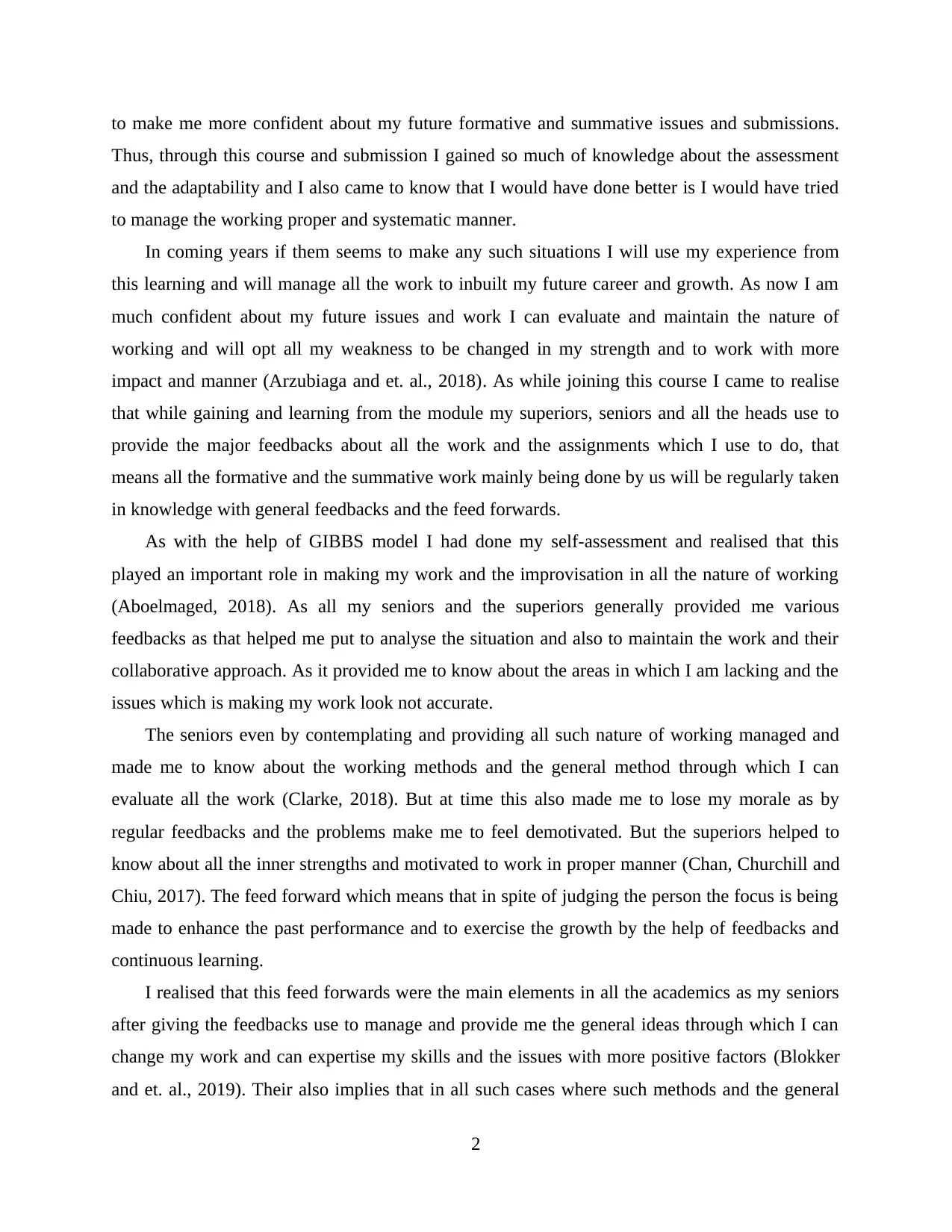
to make me more confident about my future formative and summative issues and submissions.
Thus, through this course and submission I gained so much of knowledge about the assessment
and the adaptability and I also came to know that I would have done better is I would have tried
to manage the working proper and systematic manner.
In coming years if them seems to make any such situations I will use my experience from
this learning and will manage all the work to inbuilt my future career and growth. As now I am
much confident about my future issues and work I can evaluate and maintain the nature of
working and will opt all my weakness to be changed in my strength and to work with more
impact and manner (Arzubiaga and et. al., 2018). As while joining this course I came to realise
that while gaining and learning from the module my superiors, seniors and all the heads use to
provide the major feedbacks about all the work and the assignments which I use to do, that
means all the formative and the summative work mainly being done by us will be regularly taken
in knowledge with general feedbacks and the feed forwards.
As with the help of GIBBS model I had done my self-assessment and realised that this
played an important role in making my work and the improvisation in all the nature of working
(Aboelmaged, 2018). As all my seniors and the superiors generally provided me various
feedbacks as that helped me put to analyse the situation and also to maintain the work and their
collaborative approach. As it provided me to know about the areas in which I am lacking and the
issues which is making my work look not accurate.
The seniors even by contemplating and providing all such nature of working managed and
made me to know about the working methods and the general method through which I can
evaluate all the work (Clarke, 2018). But at time this also made me to lose my morale as by
regular feedbacks and the problems make me to feel demotivated. But the superiors helped to
know about all the inner strengths and motivated to work in proper manner (Chan, Churchill and
Chiu, 2017). The feed forward which means that in spite of judging the person the focus is being
made to enhance the past performance and to exercise the growth by the help of feedbacks and
continuous learning.
I realised that this feed forwards were the main elements in all the academics as my seniors
after giving the feedbacks use to manage and provide me the general ideas through which I can
change my work and can expertise my skills and the issues with more positive factors (Blokker
and et. al., 2019). Their also implies that in all such cases where such methods and the general
2
Thus, through this course and submission I gained so much of knowledge about the assessment
and the adaptability and I also came to know that I would have done better is I would have tried
to manage the working proper and systematic manner.
In coming years if them seems to make any such situations I will use my experience from
this learning and will manage all the work to inbuilt my future career and growth. As now I am
much confident about my future issues and work I can evaluate and maintain the nature of
working and will opt all my weakness to be changed in my strength and to work with more
impact and manner (Arzubiaga and et. al., 2018). As while joining this course I came to realise
that while gaining and learning from the module my superiors, seniors and all the heads use to
provide the major feedbacks about all the work and the assignments which I use to do, that
means all the formative and the summative work mainly being done by us will be regularly taken
in knowledge with general feedbacks and the feed forwards.
As with the help of GIBBS model I had done my self-assessment and realised that this
played an important role in making my work and the improvisation in all the nature of working
(Aboelmaged, 2018). As all my seniors and the superiors generally provided me various
feedbacks as that helped me put to analyse the situation and also to maintain the work and their
collaborative approach. As it provided me to know about the areas in which I am lacking and the
issues which is making my work look not accurate.
The seniors even by contemplating and providing all such nature of working managed and
made me to know about the working methods and the general method through which I can
evaluate all the work (Clarke, 2018). But at time this also made me to lose my morale as by
regular feedbacks and the problems make me to feel demotivated. But the superiors helped to
know about all the inner strengths and motivated to work in proper manner (Chan, Churchill and
Chiu, 2017). The feed forward which means that in spite of judging the person the focus is being
made to enhance the past performance and to exercise the growth by the help of feedbacks and
continuous learning.
I realised that this feed forwards were the main elements in all the academics as my seniors
after giving the feedbacks use to manage and provide me the general ideas through which I can
change my work and can expertise my skills and the issues with more positive factors (Blokker
and et. al., 2019). Their also implies that in all such cases where such methods and the general
2
Paraphrase This Document
Need a fresh take? Get an instant paraphrase of this document with our AI Paraphraser
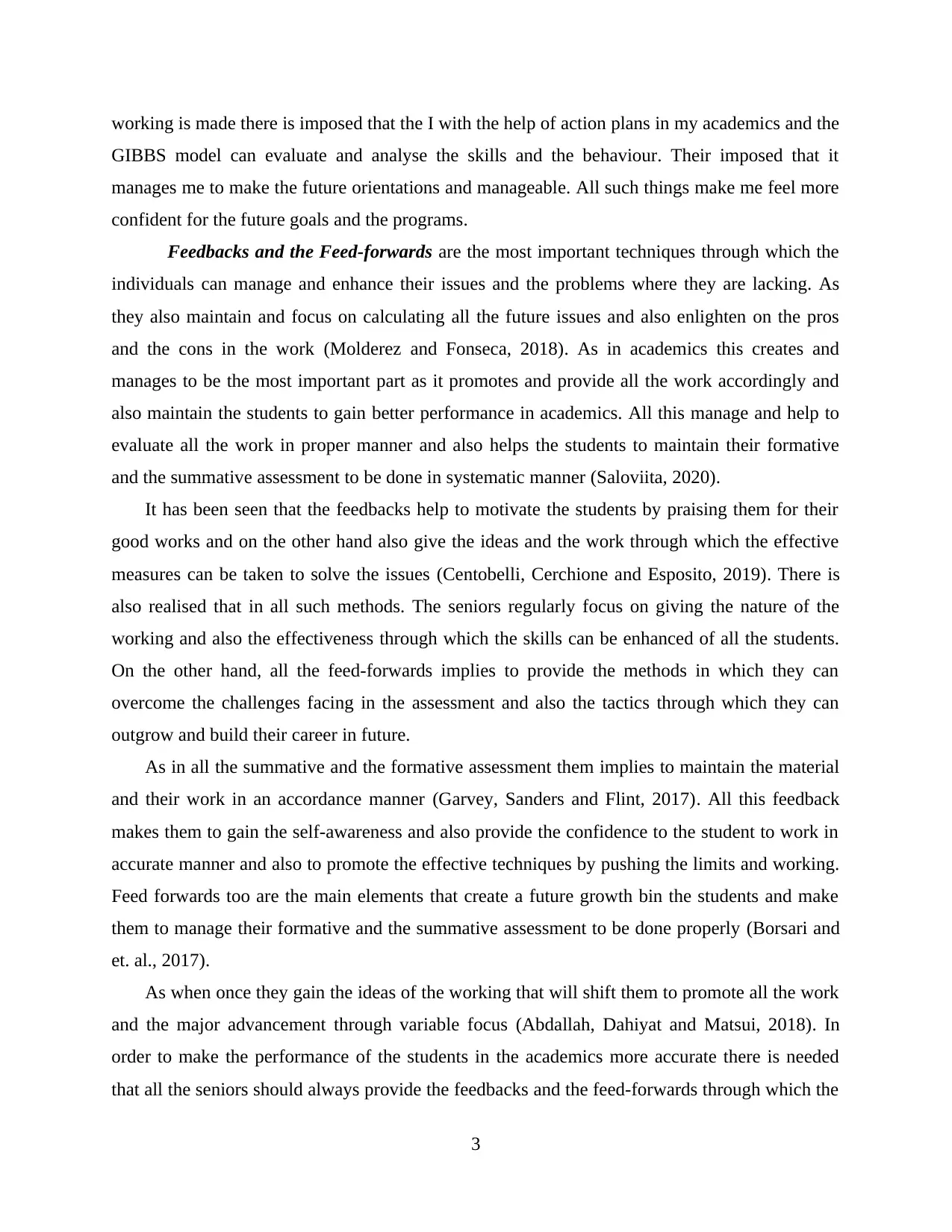
working is made there is imposed that the I with the help of action plans in my academics and the
GIBBS model can evaluate and analyse the skills and the behaviour. Their imposed that it
manages me to make the future orientations and manageable. All such things make me feel more
confident for the future goals and the programs.
Feedbacks and the Feed-forwards are the most important techniques through which the
individuals can manage and enhance their issues and the problems where they are lacking. As
they also maintain and focus on calculating all the future issues and also enlighten on the pros
and the cons in the work (Molderez and Fonseca, 2018). As in academics this creates and
manages to be the most important part as it promotes and provide all the work accordingly and
also maintain the students to gain better performance in academics. All this manage and help to
evaluate all the work in proper manner and also helps the students to maintain their formative
and the summative assessment to be done in systematic manner (Saloviita, 2020).
It has been seen that the feedbacks help to motivate the students by praising them for their
good works and on the other hand also give the ideas and the work through which the effective
measures can be taken to solve the issues (Centobelli, Cerchione and Esposito, 2019). There is
also realised that in all such methods. The seniors regularly focus on giving the nature of the
working and also the effectiveness through which the skills can be enhanced of all the students.
On the other hand, all the feed-forwards implies to provide the methods in which they can
overcome the challenges facing in the assessment and also the tactics through which they can
outgrow and build their career in future.
As in all the summative and the formative assessment them implies to maintain the material
and their work in an accordance manner (Garvey, Sanders and Flint, 2017). All this feedback
makes them to gain the self-awareness and also provide the confidence to the student to work in
accurate manner and also to promote the effective techniques by pushing the limits and working.
Feed forwards too are the main elements that create a future growth bin the students and make
them to manage their formative and the summative assessment to be done properly (Borsari and
et. al., 2017).
As when once they gain the ideas of the working that will shift them to promote all the work
and the major advancement through variable focus (Abdallah, Dahiyat and Matsui, 2018). In
order to make the performance of the students in the academics more accurate there is needed
that all the seniors should always provide the feedbacks and the feed-forwards through which the
3
GIBBS model can evaluate and analyse the skills and the behaviour. Their imposed that it
manages me to make the future orientations and manageable. All such things make me feel more
confident for the future goals and the programs.
Feedbacks and the Feed-forwards are the most important techniques through which the
individuals can manage and enhance their issues and the problems where they are lacking. As
they also maintain and focus on calculating all the future issues and also enlighten on the pros
and the cons in the work (Molderez and Fonseca, 2018). As in academics this creates and
manages to be the most important part as it promotes and provide all the work accordingly and
also maintain the students to gain better performance in academics. All this manage and help to
evaluate all the work in proper manner and also helps the students to maintain their formative
and the summative assessment to be done in systematic manner (Saloviita, 2020).
It has been seen that the feedbacks help to motivate the students by praising them for their
good works and on the other hand also give the ideas and the work through which the effective
measures can be taken to solve the issues (Centobelli, Cerchione and Esposito, 2019). There is
also realised that in all such methods. The seniors regularly focus on giving the nature of the
working and also the effectiveness through which the skills can be enhanced of all the students.
On the other hand, all the feed-forwards implies to provide the methods in which they can
overcome the challenges facing in the assessment and also the tactics through which they can
outgrow and build their career in future.
As in all the summative and the formative assessment them implies to maintain the material
and their work in an accordance manner (Garvey, Sanders and Flint, 2017). All this feedback
makes them to gain the self-awareness and also provide the confidence to the student to work in
accurate manner and also to promote the effective techniques by pushing the limits and working.
Feed forwards too are the main elements that create a future growth bin the students and make
them to manage their formative and the summative assessment to be done properly (Borsari and
et. al., 2017).
As when once they gain the ideas of the working that will shift them to promote all the work
and the major advancement through variable focus (Abdallah, Dahiyat and Matsui, 2018). In
order to make the performance of the students in the academics more accurate there is needed
that all the seniors should always provide the feedbacks and the feed-forwards through which the
3
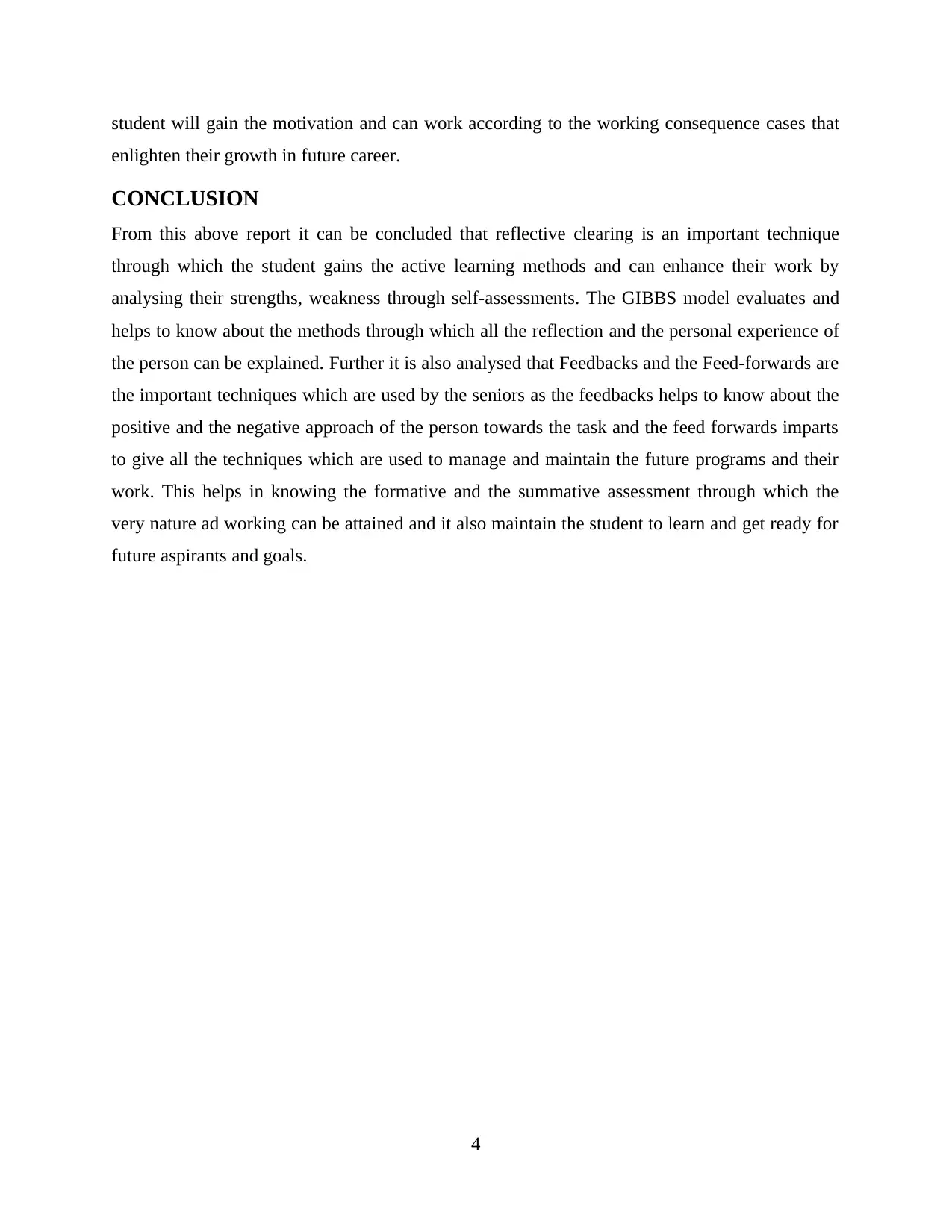
student will gain the motivation and can work according to the working consequence cases that
enlighten their growth in future career.
CONCLUSION
From this above report it can be concluded that reflective clearing is an important technique
through which the student gains the active learning methods and can enhance their work by
analysing their strengths, weakness through self-assessments. The GIBBS model evaluates and
helps to know about the methods through which all the reflection and the personal experience of
the person can be explained. Further it is also analysed that Feedbacks and the Feed-forwards are
the important techniques which are used by the seniors as the feedbacks helps to know about the
positive and the negative approach of the person towards the task and the feed forwards imparts
to give all the techniques which are used to manage and maintain the future programs and their
work. This helps in knowing the formative and the summative assessment through which the
very nature ad working can be attained and it also maintain the student to learn and get ready for
future aspirants and goals.
4
enlighten their growth in future career.
CONCLUSION
From this above report it can be concluded that reflective clearing is an important technique
through which the student gains the active learning methods and can enhance their work by
analysing their strengths, weakness through self-assessments. The GIBBS model evaluates and
helps to know about the methods through which all the reflection and the personal experience of
the person can be explained. Further it is also analysed that Feedbacks and the Feed-forwards are
the important techniques which are used by the seniors as the feedbacks helps to know about the
positive and the negative approach of the person towards the task and the feed forwards imparts
to give all the techniques which are used to manage and maintain the future programs and their
work. This helps in knowing the formative and the summative assessment through which the
very nature ad working can be attained and it also maintain the student to learn and get ready for
future aspirants and goals.
4
⊘ This is a preview!⊘
Do you want full access?
Subscribe today to unlock all pages.

Trusted by 1+ million students worldwide
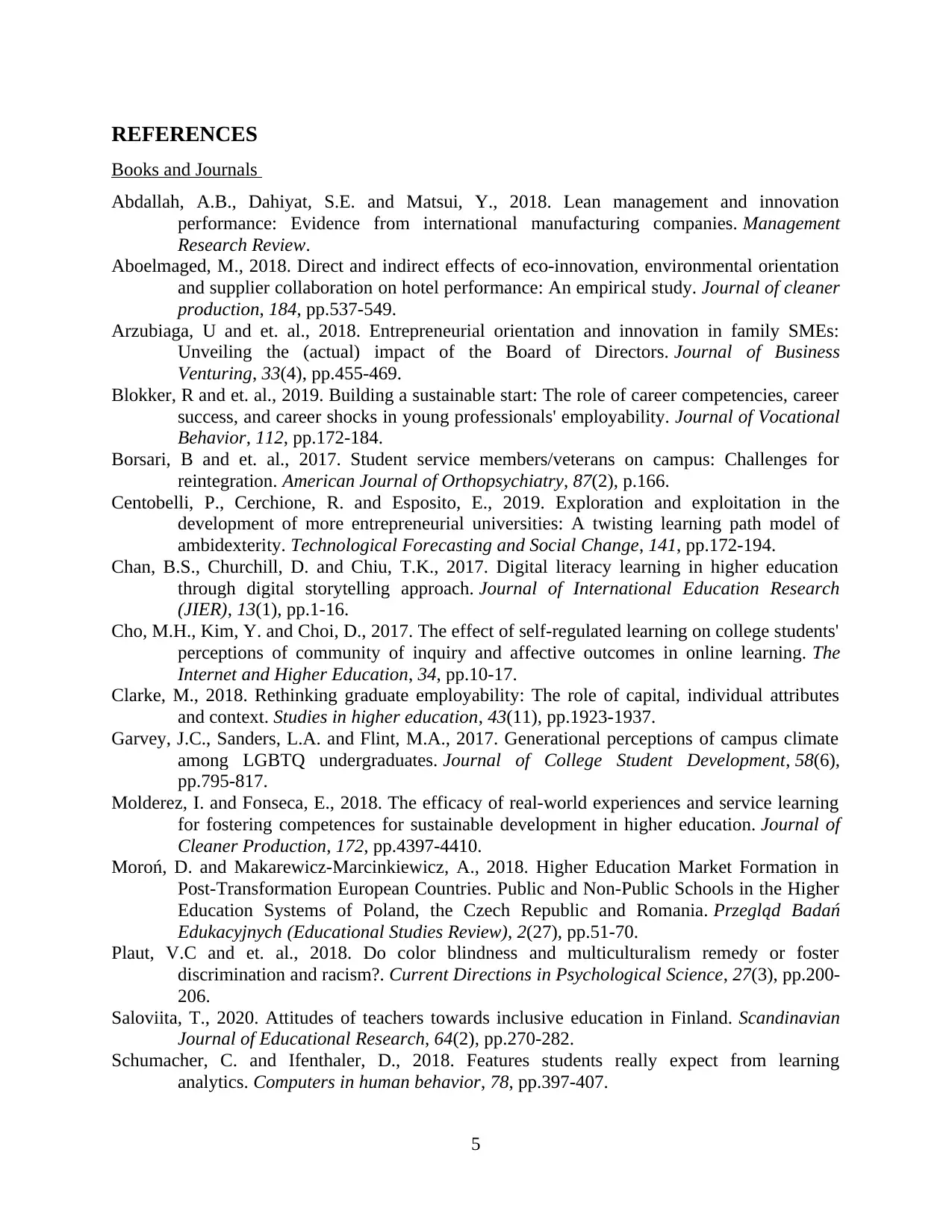
REFERENCES
Books and Journals
Abdallah, A.B., Dahiyat, S.E. and Matsui, Y., 2018. Lean management and innovation
performance: Evidence from international manufacturing companies. Management
Research Review.
Aboelmaged, M., 2018. Direct and indirect effects of eco-innovation, environmental orientation
and supplier collaboration on hotel performance: An empirical study. Journal of cleaner
production, 184, pp.537-549.
Arzubiaga, U and et. al., 2018. Entrepreneurial orientation and innovation in family SMEs:
Unveiling the (actual) impact of the Board of Directors. Journal of Business
Venturing, 33(4), pp.455-469.
Blokker, R and et. al., 2019. Building a sustainable start: The role of career competencies, career
success, and career shocks in young professionals' employability. Journal of Vocational
Behavior, 112, pp.172-184.
Borsari, B and et. al., 2017. Student service members/veterans on campus: Challenges for
reintegration. American Journal of Orthopsychiatry, 87(2), p.166.
Centobelli, P., Cerchione, R. and Esposito, E., 2019. Exploration and exploitation in the
development of more entrepreneurial universities: A twisting learning path model of
ambidexterity. Technological Forecasting and Social Change, 141, pp.172-194.
Chan, B.S., Churchill, D. and Chiu, T.K., 2017. Digital literacy learning in higher education
through digital storytelling approach. Journal of International Education Research
(JIER), 13(1), pp.1-16.
Cho, M.H., Kim, Y. and Choi, D., 2017. The effect of self-regulated learning on college students'
perceptions of community of inquiry and affective outcomes in online learning. The
Internet and Higher Education, 34, pp.10-17.
Clarke, M., 2018. Rethinking graduate employability: The role of capital, individual attributes
and context. Studies in higher education, 43(11), pp.1923-1937.
Garvey, J.C., Sanders, L.A. and Flint, M.A., 2017. Generational perceptions of campus climate
among LGBTQ undergraduates. Journal of College Student Development, 58(6),
pp.795-817.
Molderez, I. and Fonseca, E., 2018. The efficacy of real-world experiences and service learning
for fostering competences for sustainable development in higher education. Journal of
Cleaner Production, 172, pp.4397-4410.
Moroń, D. and Makarewicz-Marcinkiewicz, A., 2018. Higher Education Market Formation in
Post-Transformation European Countries. Public and Non-Public Schools in the Higher
Education Systems of Poland, the Czech Republic and Romania. Przegląd Badań
Edukacyjnych (Educational Studies Review), 2(27), pp.51-70.
Plaut, V.C and et. al., 2018. Do color blindness and multiculturalism remedy or foster
discrimination and racism?. Current Directions in Psychological Science, 27(3), pp.200-
206.
Saloviita, T., 2020. Attitudes of teachers towards inclusive education in Finland. Scandinavian
Journal of Educational Research, 64(2), pp.270-282.
Schumacher, C. and Ifenthaler, D., 2018. Features students really expect from learning
analytics. Computers in human behavior, 78, pp.397-407.
5
Books and Journals
Abdallah, A.B., Dahiyat, S.E. and Matsui, Y., 2018. Lean management and innovation
performance: Evidence from international manufacturing companies. Management
Research Review.
Aboelmaged, M., 2018. Direct and indirect effects of eco-innovation, environmental orientation
and supplier collaboration on hotel performance: An empirical study. Journal of cleaner
production, 184, pp.537-549.
Arzubiaga, U and et. al., 2018. Entrepreneurial orientation and innovation in family SMEs:
Unveiling the (actual) impact of the Board of Directors. Journal of Business
Venturing, 33(4), pp.455-469.
Blokker, R and et. al., 2019. Building a sustainable start: The role of career competencies, career
success, and career shocks in young professionals' employability. Journal of Vocational
Behavior, 112, pp.172-184.
Borsari, B and et. al., 2017. Student service members/veterans on campus: Challenges for
reintegration. American Journal of Orthopsychiatry, 87(2), p.166.
Centobelli, P., Cerchione, R. and Esposito, E., 2019. Exploration and exploitation in the
development of more entrepreneurial universities: A twisting learning path model of
ambidexterity. Technological Forecasting and Social Change, 141, pp.172-194.
Chan, B.S., Churchill, D. and Chiu, T.K., 2017. Digital literacy learning in higher education
through digital storytelling approach. Journal of International Education Research
(JIER), 13(1), pp.1-16.
Cho, M.H., Kim, Y. and Choi, D., 2017. The effect of self-regulated learning on college students'
perceptions of community of inquiry and affective outcomes in online learning. The
Internet and Higher Education, 34, pp.10-17.
Clarke, M., 2018. Rethinking graduate employability: The role of capital, individual attributes
and context. Studies in higher education, 43(11), pp.1923-1937.
Garvey, J.C., Sanders, L.A. and Flint, M.A., 2017. Generational perceptions of campus climate
among LGBTQ undergraduates. Journal of College Student Development, 58(6),
pp.795-817.
Molderez, I. and Fonseca, E., 2018. The efficacy of real-world experiences and service learning
for fostering competences for sustainable development in higher education. Journal of
Cleaner Production, 172, pp.4397-4410.
Moroń, D. and Makarewicz-Marcinkiewicz, A., 2018. Higher Education Market Formation in
Post-Transformation European Countries. Public and Non-Public Schools in the Higher
Education Systems of Poland, the Czech Republic and Romania. Przegląd Badań
Edukacyjnych (Educational Studies Review), 2(27), pp.51-70.
Plaut, V.C and et. al., 2018. Do color blindness and multiculturalism remedy or foster
discrimination and racism?. Current Directions in Psychological Science, 27(3), pp.200-
206.
Saloviita, T., 2020. Attitudes of teachers towards inclusive education in Finland. Scandinavian
Journal of Educational Research, 64(2), pp.270-282.
Schumacher, C. and Ifenthaler, D., 2018. Features students really expect from learning
analytics. Computers in human behavior, 78, pp.397-407.
5
Paraphrase This Document
Need a fresh take? Get an instant paraphrase of this document with our AI Paraphraser
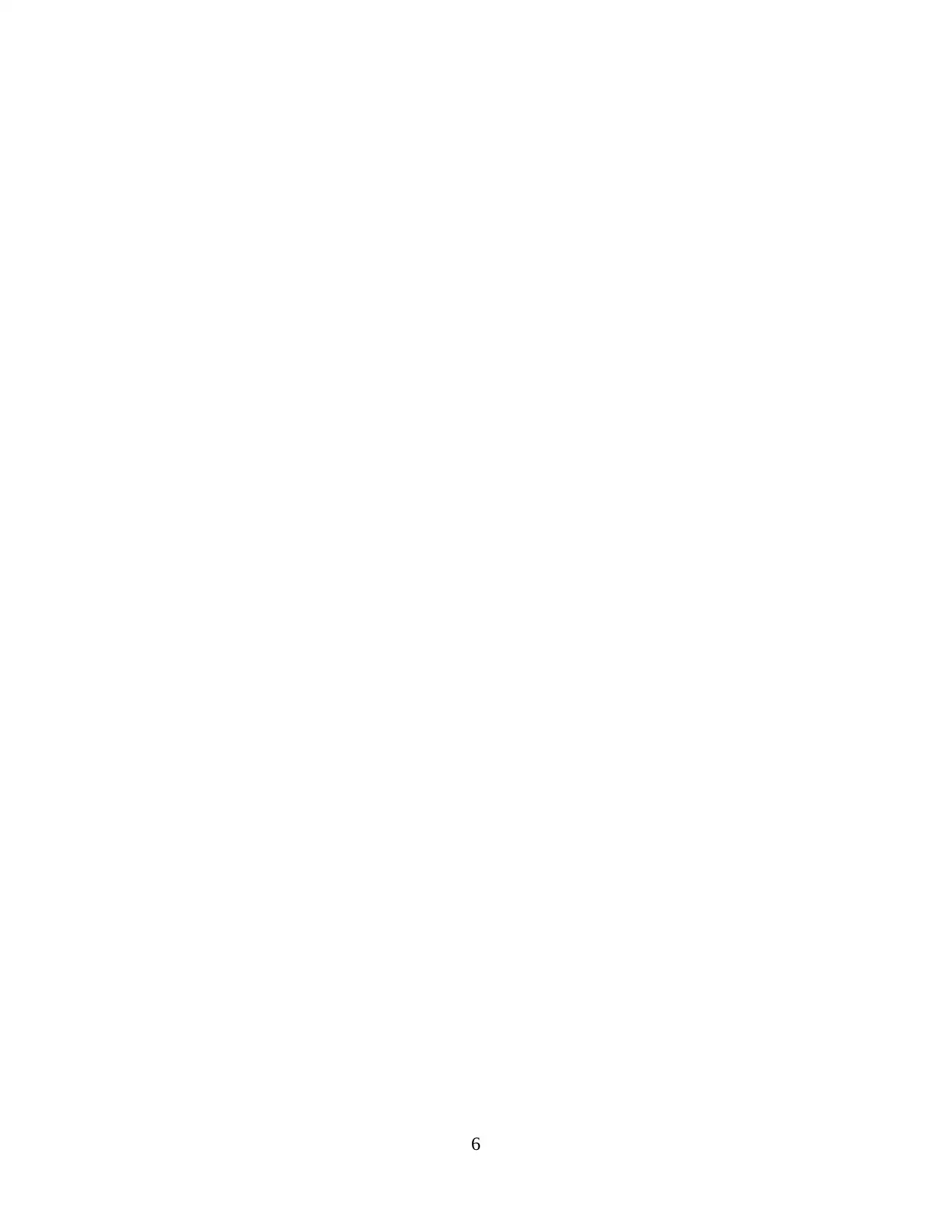
6
1 out of 8
Related Documents
Your All-in-One AI-Powered Toolkit for Academic Success.
+13062052269
info@desklib.com
Available 24*7 on WhatsApp / Email
![[object Object]](/_next/static/media/star-bottom.7253800d.svg)
Unlock your academic potential
Copyright © 2020–2026 A2Z Services. All Rights Reserved. Developed and managed by ZUCOL.



